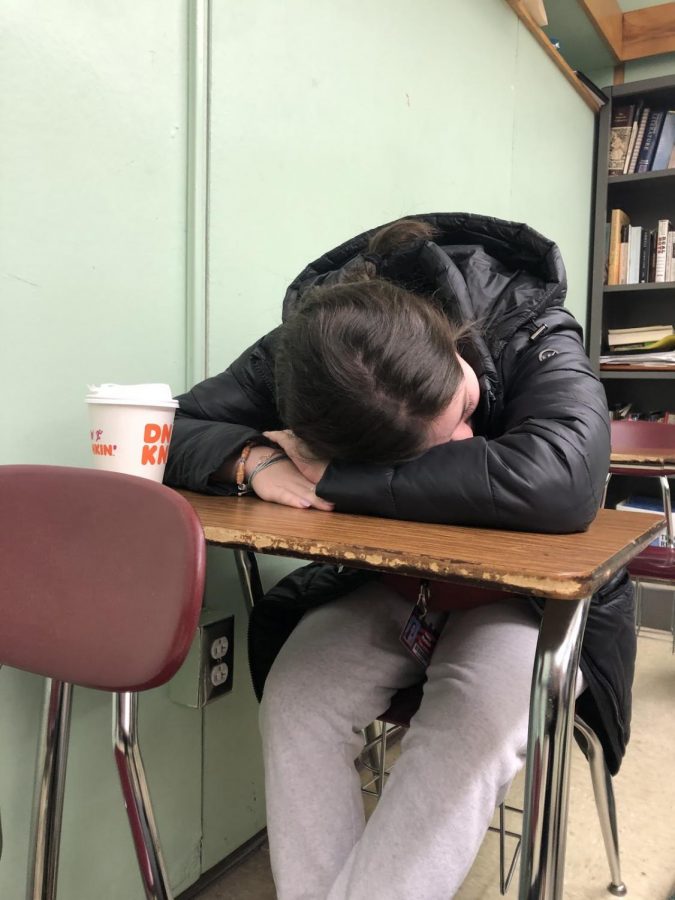How Much Sleep Do Teens Really Need?
January 15, 2020
Tired eyes and a sluggish disposition would not be hard to find among a room of teenagers. Teens are often labeled as ‘night owls’, frequently staying up until the early morning hours and sleeping away their weekends to make up for lost sleep. Unfortunately, this label is not a baseless one. So how much sleep do teens really need to feel healthy and well rested?
Teenager’s lives, in today’s age, involve increasing amounts of responsibility. Whether it be through participating in extracurriculars, completing homework, working a job, or helping with family, teens are required to expend a large amount of energy and time. Furthermore, according to the Better Health Channel, the use of screens at night reduces the ability to sleep soundly. For these reasons, and many more, sleep deprivation has become common in teenagers.
According to data taken by National Youth Risk Behavior Surveys in 2015, about 7 out of 10 highschool students are not getting enough sleep. But the lack of sleep among teens is not merely a consequence of everyday circumstances, it is also caused by a physical changes that occur during puberty.
According to sleep expert Laura Sterni, M.D., teenagers experience “a natural shift in circadian rhythm” during puberty. A circadian rhythm is a process by which our bodies regulate the ‘sleep-wake cycle’ that we experience every 24 hours. When this biological shift occurs, it causes teens to have difficulty falling asleep before 11 p.m. This is due to a later release of melatonin in the body. Not only does this physical change cause teens to feel tired later in the evening, but it also causes them to remain tired farther into the morning hours.
So how much sleep is really enough? Pediatrician Michael Crocetti M.D., says it is vital for teens to get 9 to 9 ½ hours of sleep per night. This amount of sleep is greater than the number suggested for a 10 year old. Why? When someone reaches their teen years, they endure a second developmental stage in which cognitive maturity is growing. Furthermore, teens need a greater amount of sleep due to physical changes that occur during and after puberty. Once A full night’s sleep supports important physical growth and brain maturation. Unfortunately, the National Sleep Foundation found that only 15% of students are getting enough sleep at night.
It is certain that almost all teens can recall hearing these kind of facts quite often. “You need more sleep!” is an idea that has been hammered into adolescent’s brains by teachers, doctors, and other trusted adults. But realistically, how can adolescents get the amount of sleep they really need?
Habits such as setting a scheduled time to get in bed, putting your phone away, and accomplishing tasks earlier are all options that most people know can aid in getting more sleep. A new option, which has been gaining popularity for many who struggle with sleep, has been on the rise: over-the-counter sleep aids.
The use of sleep aids such as NyQuil, Advil PM, and Uniso. While these over the counter medications can help you fall asleep faster, the usage of them comes with a risk. These type of sleep aids can cause drug dependence, long term drowsiness, and many other side effects. Fortunately, there is a safer alternative. Melatonin is a natural chemical already produced by our brains naturally to aid in the control of our 24 hours sleep cycle. Melatonin supplements can be taken in order to aid this natural process. Over 3 million Americans in 2012, according to the Centers for Disease Control and Prevention, have put Melatonin to use. This supplement has been widely successful in helping those who have trouble falling and staying asleep at night.
As a teen, it is essential to take steps to ensure you are developing properly. Weigh the options, and decide what will help you to obtain the amount of sleep that is necessary for proper development.



